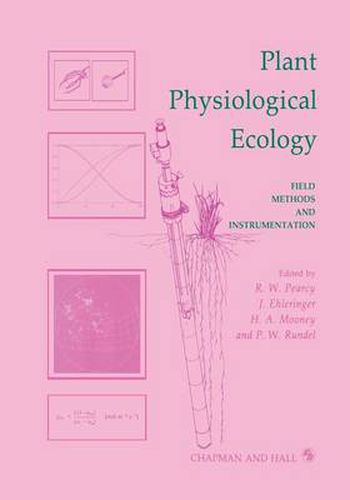Readings Newsletter
Become a Readings Member to make your shopping experience even easier.
Sign in or sign up for free!
You’re not far away from qualifying for FREE standard shipping within Australia
You’ve qualified for FREE standard shipping within Australia
The cart is loading…






This title is printed to order. This book may have been self-published. If so, we cannot guarantee the quality of the content. In the main most books will have gone through the editing process however some may not. We therefore suggest that you be aware of this before ordering this book. If in doubt check either the author or publisher’s details as we are unable to accept any returns unless they are faulty. Please contact us if you have any questions.
Physiological plant ecology is primarily concerned with the function and performance of plants in their environment. Within this broad focus, attempts are made on one hand to understand the underlying physiological, biochemical and molecular attributes of plants with respect to performance under the constraints imposed by the environment. On the other hand physiological ecology is also concerned with a more synthetic view which attempts to under stand the distribution and success of plants measured in terms of the factors that promote long-term survival and reproduction in the environment. These concerns are not mutually exclusive but rather represent a continuum of research approaches. Osmond et al. (1980) have elegantly pointed this out in a space-time scale showing that the concerns of physiological ecology range from biochemical and organelle-scale events with time constants of a second or minutes to succession and evolutionary-scale events involving communities and ecosystems and thousands, if not millions, of years. The focus of physiological ecology is typically at the single leaf or root system level extending up to the whole plant. The time scale is on the order of minutes to a year. The activities of individual physiological ecologists extend in one direction or the other, but few if any are directly concerned with the whole space-time scale. In their work, however, they must be cognizant both of the underlying mechanisms as well as the consequences to ecological and evolutionary processes.
$9.00 standard shipping within Australia
FREE standard shipping within Australia for orders over $100.00
Express & International shipping calculated at checkout
This title is printed to order. This book may have been self-published. If so, we cannot guarantee the quality of the content. In the main most books will have gone through the editing process however some may not. We therefore suggest that you be aware of this before ordering this book. If in doubt check either the author or publisher’s details as we are unable to accept any returns unless they are faulty. Please contact us if you have any questions.
Physiological plant ecology is primarily concerned with the function and performance of plants in their environment. Within this broad focus, attempts are made on one hand to understand the underlying physiological, biochemical and molecular attributes of plants with respect to performance under the constraints imposed by the environment. On the other hand physiological ecology is also concerned with a more synthetic view which attempts to under stand the distribution and success of plants measured in terms of the factors that promote long-term survival and reproduction in the environment. These concerns are not mutually exclusive but rather represent a continuum of research approaches. Osmond et al. (1980) have elegantly pointed this out in a space-time scale showing that the concerns of physiological ecology range from biochemical and organelle-scale events with time constants of a second or minutes to succession and evolutionary-scale events involving communities and ecosystems and thousands, if not millions, of years. The focus of physiological ecology is typically at the single leaf or root system level extending up to the whole plant. The time scale is on the order of minutes to a year. The activities of individual physiological ecologists extend in one direction or the other, but few if any are directly concerned with the whole space-time scale. In their work, however, they must be cognizant both of the underlying mechanisms as well as the consequences to ecological and evolutionary processes.